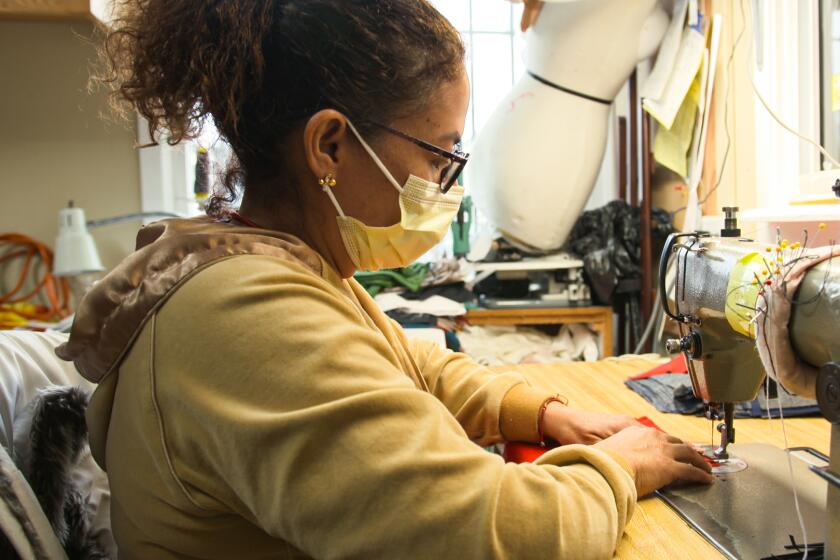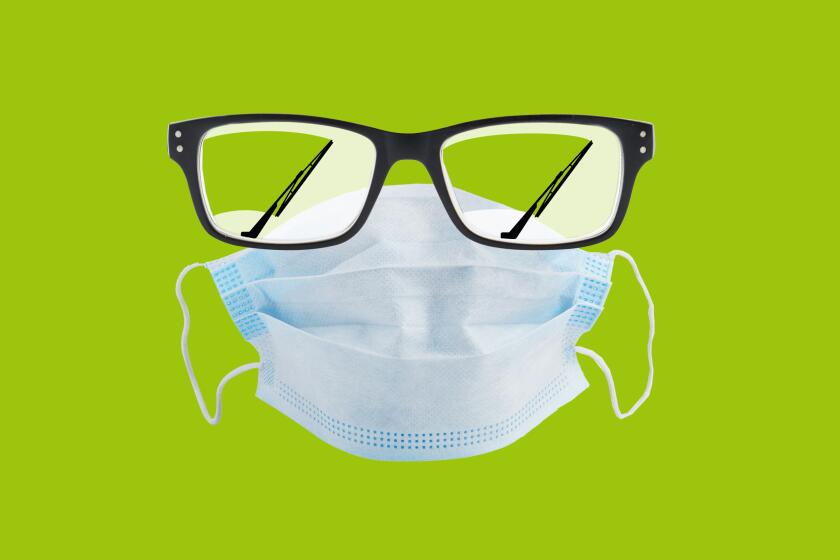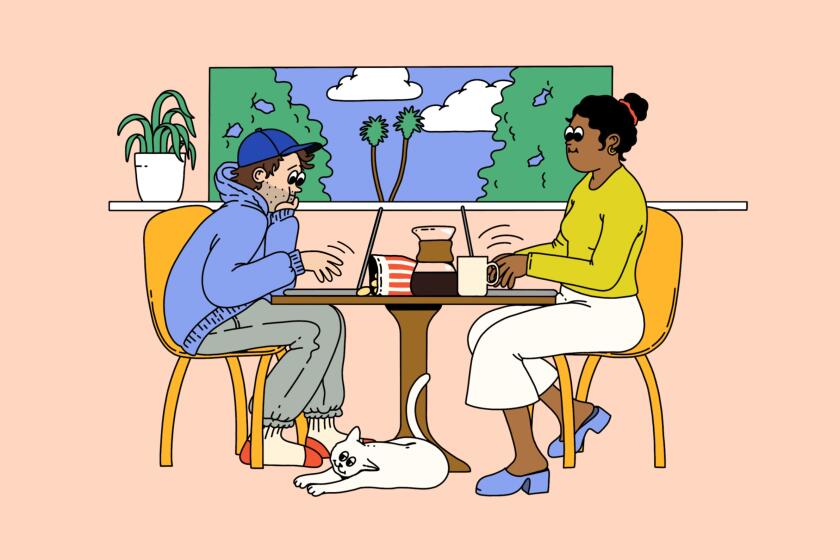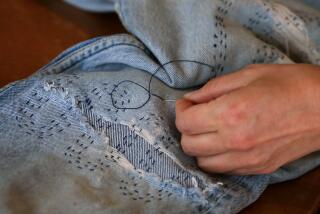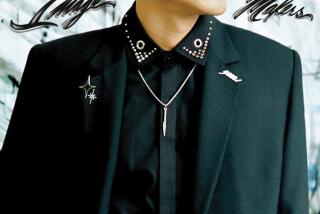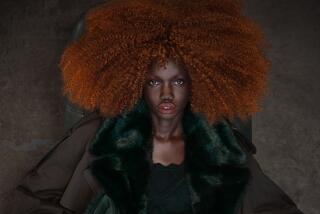The coronavirus hit the fashion industry hard. Here’s how eight L.A. designers are getting by
It’s the 50th anniversary of Earth Day, but what’s on the minds of sustainable fashion and accessories designers in Los Angeles is this question: How will they stay alive?
With the coronavirus pandemic hitting the fashion industry hard, sustainable brands in the L.A. market are doing what they can to accommodate customers and remain afloat. Here are some of their stories.
Being innovative: Deborah Lindquist
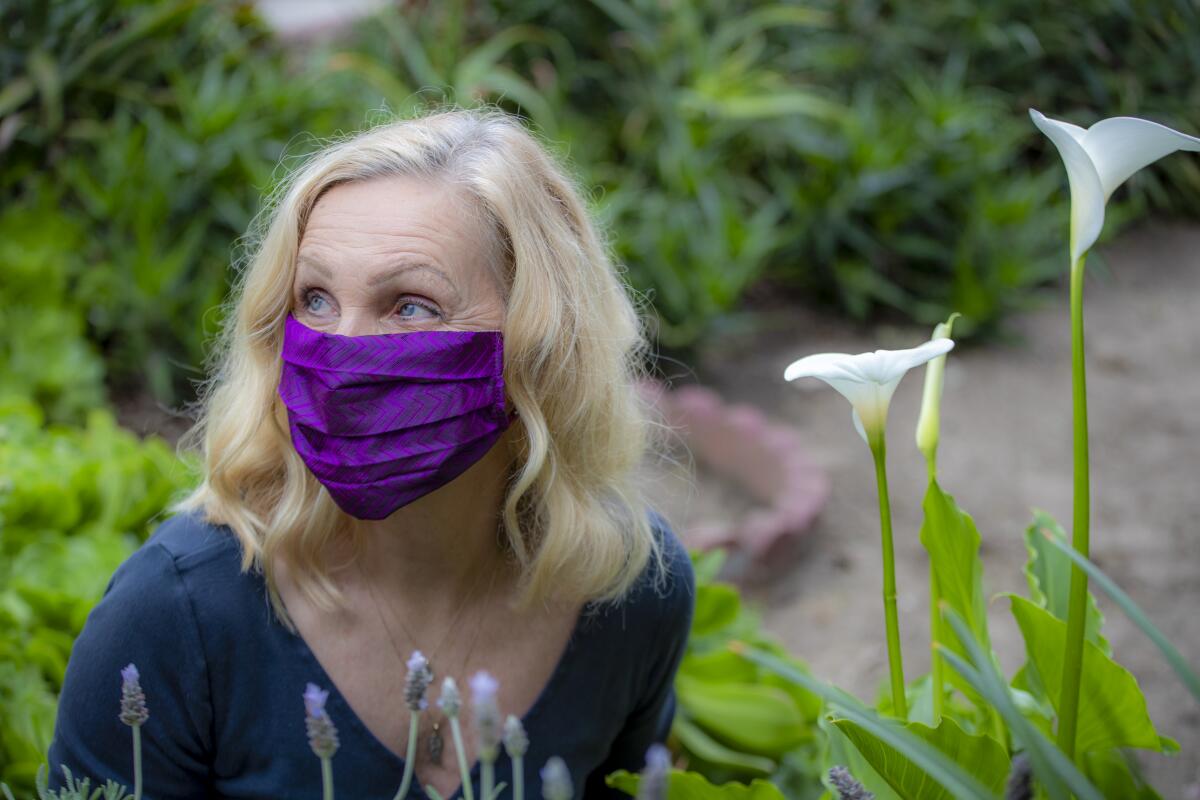
“We don’t know how long this shutdown will last, don’t know who will be forced out of business permanently, and wonder if our own restructuring ideas are good ones,” said Deborah Lindquist, an eco-conscious clothing, accessories and home-decor designer who has designed for celebrities including Sharon Stone, Pink, Jessica Alba, Christina Aguilera and Rihanna.
“Small businesses are the lifeblood of our country, just as important in big cities as they are in small communities,” she said.
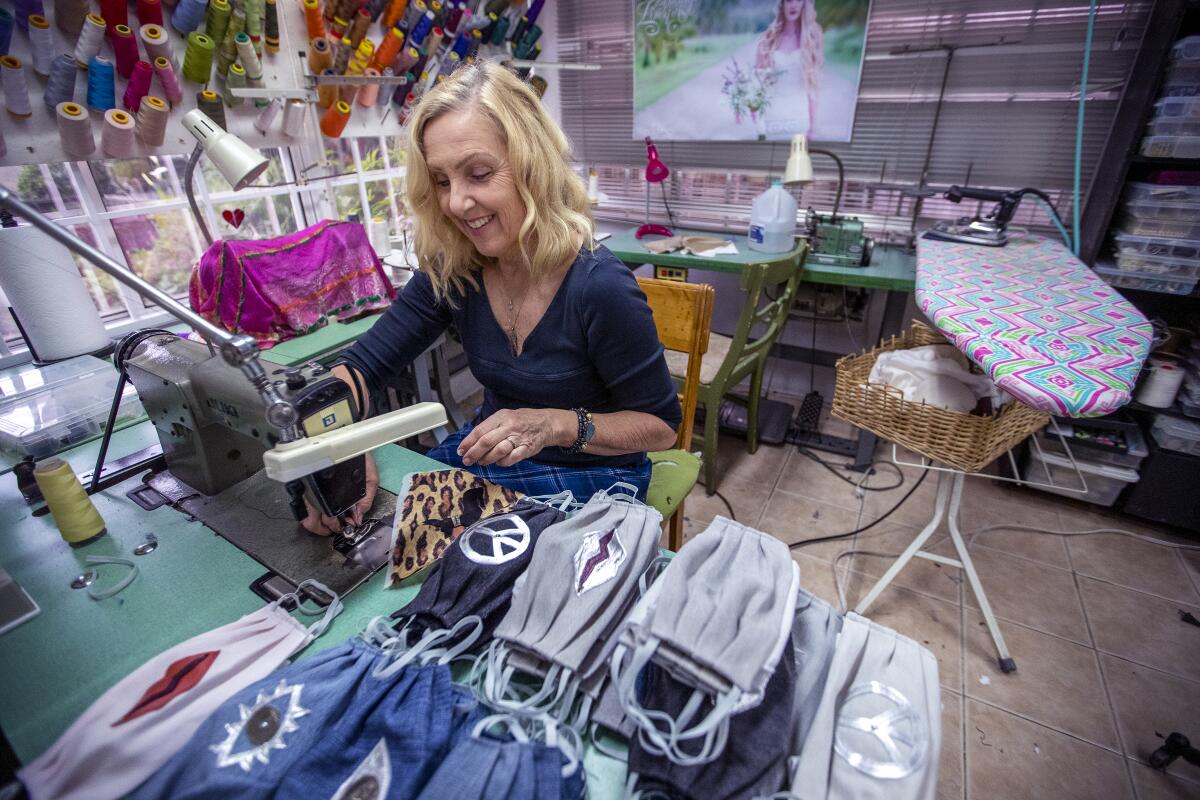
Lindquist has turned her focus to creating masks at her North Hollywood home by using leftover pieces from her upcycled denim jackets, which are embellished with appliques, studs and rhinestones. “For other woven mask designs, I am using pieces of silk prints from my dress, skirt and blouse production in leopard, sari, vintage kimono,” she said. “And I’m doing a group of white masks with my friends and family in healthcare in mind made of vintage table linens and napkins.
“As an innovative designer, I’ve always figured out ways to use materials on hand. Since we need to cover our faces, we may as well look cool. I think it’s a good idea to have a wardrobe of masks these days not only to have a fresh one handy but to keep it interesting.”
Changing focus: Dalia MacPhee
In January, designer Dalia MacPhee could see the writing on the wall by looking at China’s fashion scene. “I was on the phone with manufacturers who were on lockdown there,” MacPhee said. “I knew it was only a matter a time before the industry would be affected here. Still, I never thought it would get this bad.”
The veteran fashion designer, whose designs have been worn by Mel B, Olivia Munn, Niecy Nash and Julianne Hough, began manufacturing certified personal protective equipment (KN95 masks, intensive-care-unit coveralls and isolation gowns) for the medical community a few weeks ago.
“I went from evening gowns to hospital gowns just like that,” she said. “We are also producing designer cloth masks with filters for the public. And because we may be working at home for the next few months, I have been working on an athleisure line as well.
“This is a scary time. Those of us in the fashion industry now also have the task of taking the new norm and making it OK. In my own line, I’ve created a new collection including matching mask-legging combos and PPE in this season’s colors. We have to add some levity and normalcy while steering the ship to safety. It’s going to take some time for regular fashion to come back.”
For years, the Cerpas sisters engaged in friendly competition, running their own dress shops. Now they’ve come together to make face masks.
Rolling with the punches: Alisun Franson
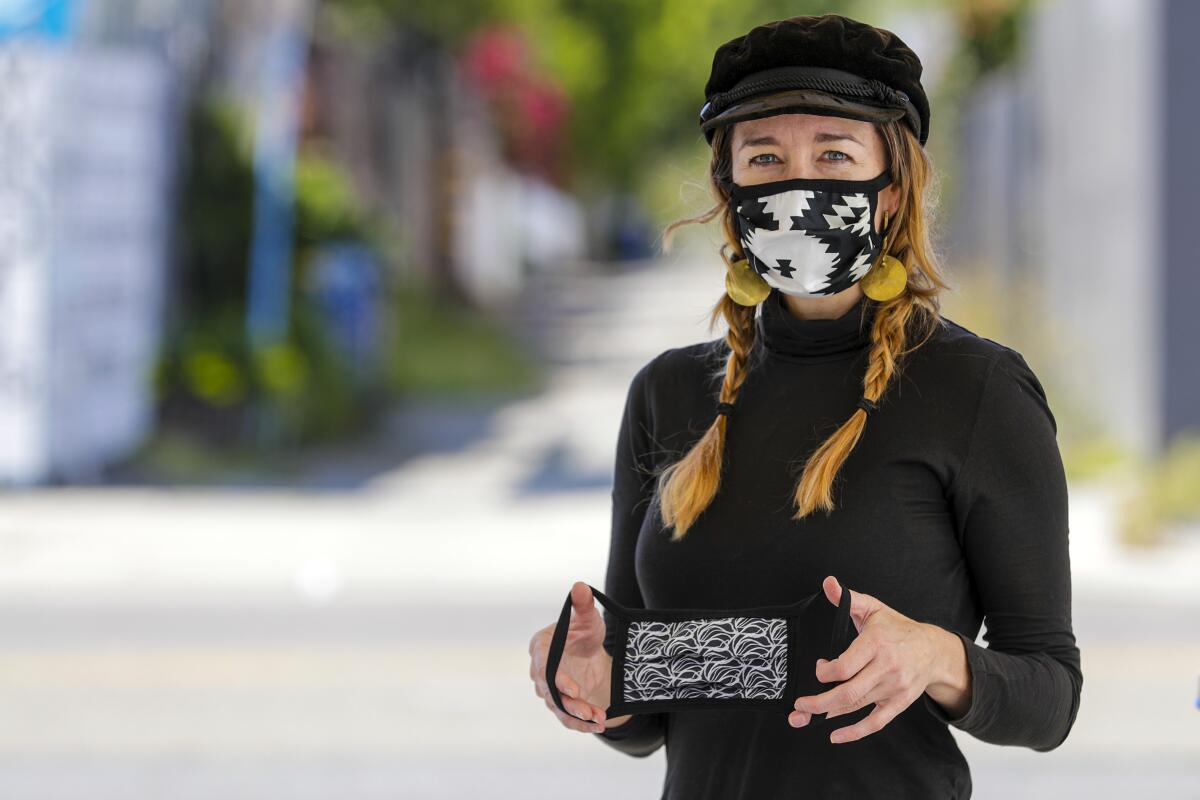
“With any challenge, you need to roll with the punches and think outside the box,” said Alisun Franson, who co-owns Venice’s Amiga Wild store with indie jewelry designer Sadie Gilliam. “We need to keep paying rents even when our store doors are closed. By brainstorming, we hope to drive customers to our online store, where customers can shop and take workshops from the safety of their home.”
Franson, who makes jewelry out of upcycled bicycle parts, also co-created a pop-up shop where consumers can buy face masks on a donation basis. “We have hand-sewn over 500 masks in the past few weeks and have provided masks to the nonprofit organization Worthy of Love, which helps children living on skid row,” she said. “We want to do whatever it takes to help the community stay protected in the fight against COVID-19.
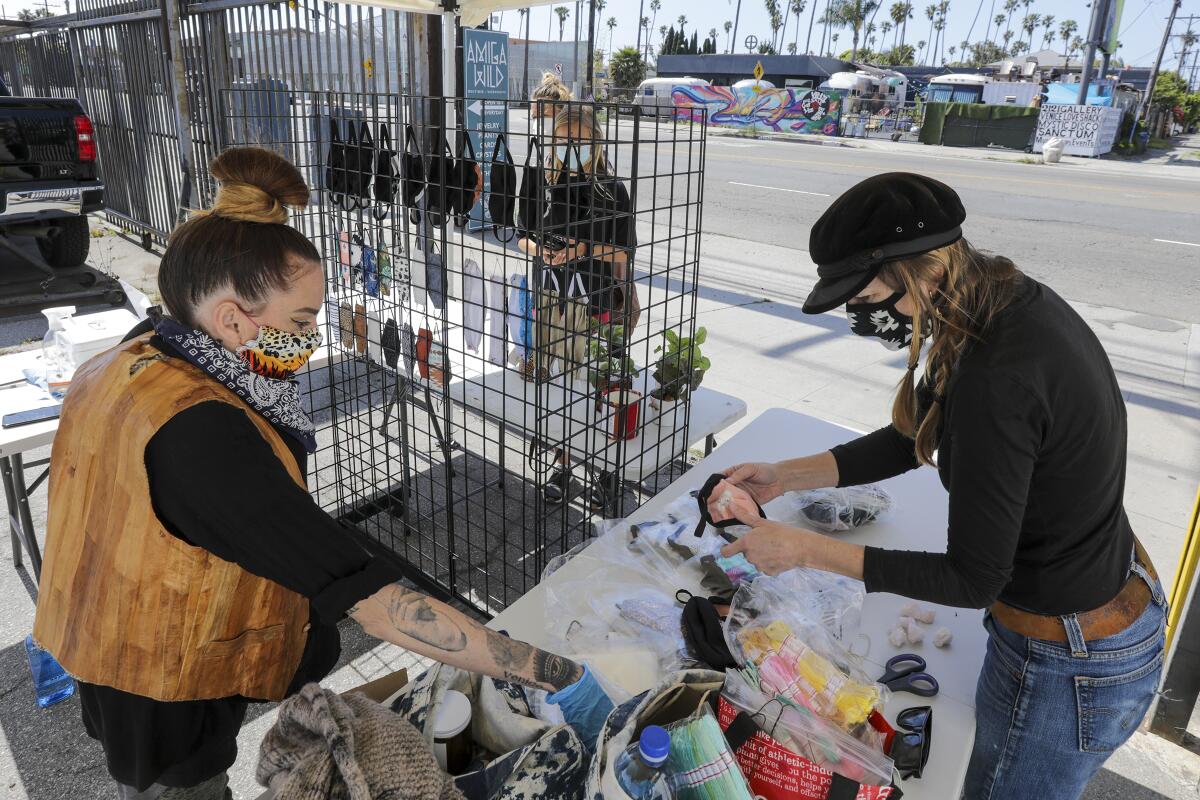
“Sustainable fashion is the future — not a trend,” she said. “It’s a lifestyle that people are adopting because they see the importance of preserving our earth. There are so many existing materials in the world. Why send them to the landfill when they can be reused and transformed into wearable art?”
Slow fashion: Desiree Buchanan
Desiree Buchanan, founder of women’s line Poplinen, has tried to adjust to the massive decrease in fashion action because of COVID-19 shutdowns and delays.
“We’re facing issues throughout the supply chain and are doing our best through mask-making,” Buchanan said. “We want to keep our local Los Angeles production partners and creative contractors busy while also being responsible about social distancing, which makes all things go a bit slower.”
Wearing masks will help minimize the spread of COVID-19. Here’s how to do it right.
Because of the stay-at-home order, all of the in-person events Buchanan had scheduled have been canceled until further notice, which has been a huge upset.
“With so much uncertainty, it’s hard to make goals for the next quarter let alone 2020 as a whole,” she said. “We’re using this time to create high-quality content that’s helpful around topics that align with our inclusivity and sustainability efforts. Our goal during this time is to be a vehicle for good in the lives of our customers and followers, doing what we can to stay true to our mission of celebrating women and meeting their needs of safety and protection.”
If sheltering in place continues, Buchanan said she hopes to find ways to work around it and help bring value back to fashion.
“For consumers, I think this will bring them to a place of making conscious purchasing choices — buying clothing that brings value and longevity to their lives,” she said. “If our teams can no longer work in close quarters for the foreseeable future, we’ll find ways to adapt. Being small and scrappy allows for a resilience around hurdles. With modern-day technology, we’ve been able to keep going so far. It’s just one day at a time; slower production as our sewers are practicing social distancing and implementing less hours to avoid spreading the pandemic.”
Strengthening the brand: Isadora Alvarez
Isadora Alvarez, founder and creative director of women’s line Back Beat Co., has pushed all of her efforts during the coronavirus outbreak toward promotion and strengthening her brand.
“Online is our only stream of income right now, so we really want to have an ongoing dialogue with our community,” she said. “Normally, a bulk of our business is wholesale, but with brick-and-mortars being closed, we are putting all our time and resources into marketing. The next couple of months will be tough, as people are going to be recovering pretty slowly.”
Creating an eco-friendly fashion line did not come easily for Alvarez, who has now made masks to donate to hospitals and essential workers.
“We’ve had issues with the industry being very old-fashioned and resistant to change for a more sustainable future,” she said. “We’ve had to convince our suppliers to use better fibers such as hemp, organic cotton, etc. There’s also an issue of minimums where we have to make a lot, so there’s a lot of waste. We’ve luckily found partners that are willing to work with us on those terms after years of hard work.
“As a woman of color, it’s always tough, because they never think of you as the boss. I get asked all the time who my boss is. The garment industry is still mostly made up of older men, so I just have to take a more direct approach when dealing with them.”
Why it’s time to put away the cargo shorts and yoga pants and find your shoes.
Flexibility is key: Mariah K. Lyons
Being malleable in a time of uncertainty is integral to the business plans of Mariah K. Lyons, founder of the sustainable footwear line Astara. “We are trying to look at this time as an opportunity for innovation, rather than simply a pause before returning to business as usual,” she said.
When the pandemic hit, the brand had to cancel productions and new launches and is working with very different timelines and “greatly modified projections,” said Lyons, who was once a publicist with celebrity shoe brand Jimmy Choo. “We are looking to shift our business model and greatly expand our offerings, [and] not only move with this massive current but also to maintain cash flow and have the ability to create fully sustainable products and build community.”
Lyons recently lowered the cost of her sustainable shoes. “We are shipping primarily direct-to-consumer at this time,” she said. “We wanted to shift our retail model and reflect the new distribution structure throughout our pricing — with the ability to reach and help more people. Our focus has always been on creating shoes that support the well-being of the body, mind, spirit and planet. Hopefully, this allows for more accessibility.”
Strength in numbers: Rachel Temko
To deal with the effects of the pandemic, Rachel Temko, owner and creative director of Whimsy and Row, started a small business alliance called Together Apart, which donates 5% of sales to Feeding America and a collective discount of 20% off to customers. “Our Together Apart campaign includes many of our stores to help promote and lift them up during this time,” Temko said. “We felt that this is much bigger than we are individually, but with like-minded small businesses, we will all rise.”
So far, the alliance has donated $990 to Feeding America and more than 1,400 masks to the Union Rescue Mission, the Downtown Women’s Center and the Midnight Mission.
For designers, the challenges of having cash flow and having enough to cover their bills has been daunting. “Many of our wholesale accounts are not accepting their orders because their stores are closed, so we are hurting from that [lack of] income and have an overstock issue,” Temko said. “Hopefully, they can survive online and start taking their orders soon.”
Having to let go of employees was “even tougher,” Temko said, but as sales increase, her staff will be called back to work. “Our production and development has completely paused, because none of our contractors can work. We are worried about meeting our deadlines.”
Despite uncertain times, Temko remains hopeful. “This could be a blessing in disguise as the fashion industry has no choice but to change,” she said. “We have already trimmed down our deliveries and plan to only create less seasonal and more versatile apparel. Fashion needs to be able to have a longer selling time and easily shift from season to season. We must evolve in order to survive.”
The future of eco-fashion: Keri Lassalle
Keri Lassalle, founder of the eco-friendly accessory line Lulu Dharma, sees the worldwide spread of COVID-19 as a kind of “collective deep breath” for Earth. “It has forced us all to pause and really think about what is important to us,” she said, “especially the fashion business, as we are one of the major contributors to pollution and waste.”
Lassalle believes the industry will quickly move from sustainability to the idea of regenerative production — the use of agricultural waste, recycled materials and responsibly grown organic cottons and materials that take into account the health and well-being of the people who are growing and sewing.
“As soon as material costs come down for these materials, many more companies will be willing to use them,” she said. “And when fashion brands truly realize the impact of creating in an unsustainable way, the direct impact, people will realize that it is absolutely essential to change course.
“Do we really want to ‘sustain’ our hurtling toward climate change, or do we want to start to turn the tide?” Lassalle asked. “The education is out there. The signs are out there, and fashion brands are taking notice. Customers are definitely interested in shopping with companies who are transparent and responsible. We will all need to be accountable.”
More to Read
Sign up for our L.A. Times Plants newsletter
At the start of each month, get a roundup of upcoming plant-related activities and events in Southern California, along with links to tips and articles you may have missed.
You may occasionally receive promotional content from the Los Angeles Times.
